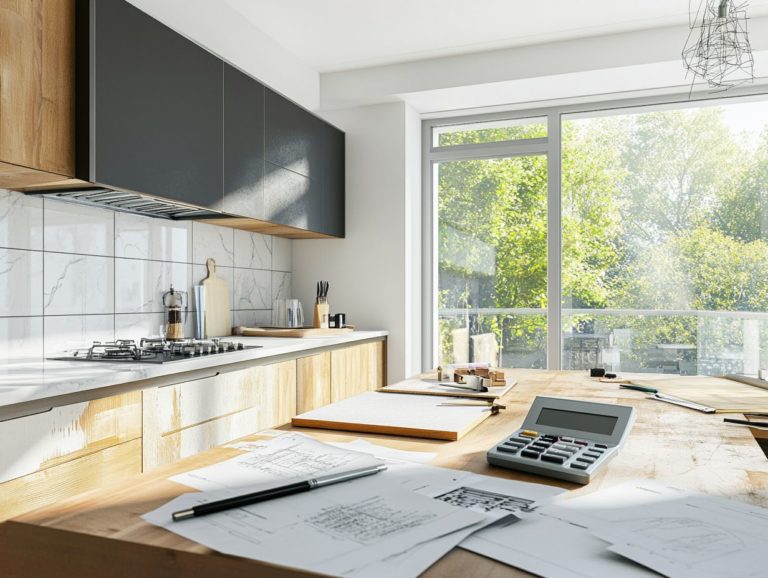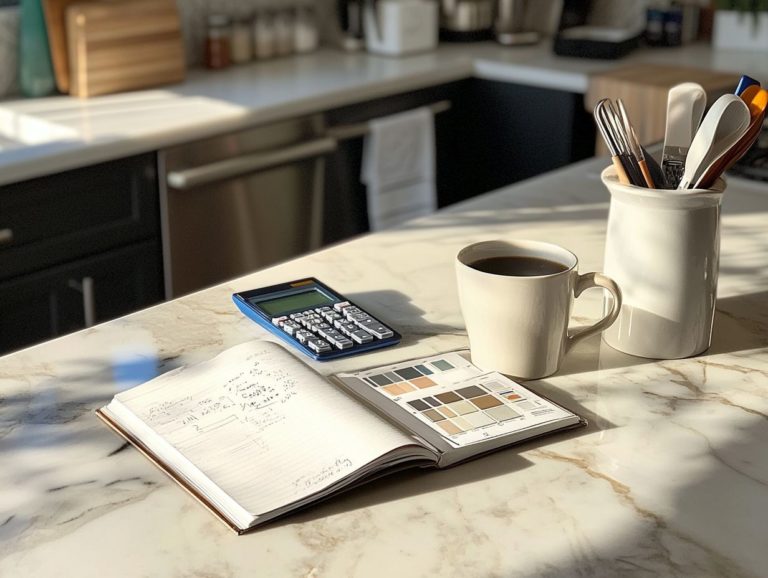How to Adjust Your Budget Mid-Remodel
Remodeling your home is an exhilarating journey, but it often presents unexpected twists, especially regarding budgeting.
Understanding the factors that influence your expenses is essential, as is recognizing when adjustments may be necessary.
This article serves as your guide to evaluating your current budget, pinpointing areas for modification, and engaging in effective communication with your contractor.
We will also provide you with strategies to keep your project on track, ensuring a successful outcome that won’t deplete your finances.
Contents
- Key Takeaways:
- Understanding Your Remodeling Budget
- Why You May Need to Adjust Your Budget
- Assessing Your Current Budget
- Strategies for Adjusting Your Budget
- Communicating with Your Contractor
- Managing Changes During the Remodel
- Finalizing Your Budget and Project
- Frequently Asked Questions
- Can I make changes to my remodeling budget once the project has started?
- What are some reasons I may need to adjust my budget during a remodel?
- How should I communicate my budget adjustments with my contractor?
- What are some ways to save money during a mid-remodel budget adjustment?
- Should I adjust my budget before or after my project is complete?
- What should I do if I can’t afford to make a necessary budget adjustment?
Key Takeaways:

Take charge of your remodeling journey! Understand budget factors to avoid surprises and communicate with your contractor to keep costs in check.
Understanding Your Remodeling Budget
Grasping your remodeling budget is key. A clear budget helps you stay on track financially.
By understanding key components—like materials costs, labor expenses, and unexpected costs—you can create a project budget that aligns with your goals.
This guide will assist you in navigating budgeting complexities, including how to interpret contractor quotes and understand the bidding process (the way contractors provide quotes for their work).
Factors that Affect Your Budget
Several factors can influence your remodeling budget. These include design layout, choice of materials, and quality of furnishings.
Whether you prefer eco-friendly furniture or luxurious accents, understanding these variables empowers you to manage your budget effectively.
Contractor referrals and their costs also play an important role in your overall construction budget, making it necessary to plan ahead and avoid unexpected expenses.
The design process can drive up labor costs, particularly with custom elements or intricate layouts, which can inflate your budget.
Choosing between stock and custom cabinetry is significant; while custom pieces enhance your space’s aesthetic, they often come with a higher price tag.
Market fluctuations can impact material costs, so it’s vital to stay informed and adaptable in your selections.
All these elements are interconnected, requiring a comprehensive understanding of the remodeling landscape to ensure your financial resources are utilized wisely.
Why You May Need to Adjust Your Budget
Adjusting your renovation budget is often necessary, as unforeseen circumstances can arise throughout the project.
You may encounter unexpected expenses tied to renovation costs that weren’t part of your original plan. These surprises could stem from design changes, additional contractor quotes, or fluctuating labor costs.
Revisiting your existing budget is crucial to ensure overall project success.
Common Reasons for Budget Changes
Several common reasons can lead to budget adjustments during a renovation. Unexpected expenses and rising labor and material costs are among them.
As you manage your project, you may find that the original budget falls short, prompting necessary adjustments.
Contractor delays or design changes can significantly impact your financial planning. Staying informed and flexible is essential.
Uncovering hidden issues, such as structural damage or outdated wiring, can also increase costs. Changes in building codes or permits required for specific renovation aspects could complicate your budgeting as well.
Your preferences may evolve during the project, leading to a desire for higher-end finishes or upgrades that weren’t part of the initial plan. Regular communication with your contractors and a proactive approach can help reduce these budget discrepancies.
Assessing Your Current Budget

Assessing your current budget is crucial for a successful home renovation. Evaluate your finances, considering your expectations and the various project phases that could affect your budget.
This means taking a close look at every aspect of the project, from the furniture budget to the potential use of loans based on your home’s value for additional funding, ensuring that all expenses are carefully tracked.
Identifying Areas for Adjustment
Identifying areas for adjustment in your renovation budget can pave the way for a more economically feasible project. Systematically review your furnishing budget and consider DIY renovation options to offset unexpected expenses.
Gathering contractor quotes from multiple sources can help pinpoint areas where costs can be trimmed or reallocated. Beyond that initial review, creating a detailed list of each scheduled expense and categorizing them can reveal which items are essential versus those that can be postponed or reimagined.
Tapping into online resources or local workshops can equip you with the skills needed for certain tasks, ultimately lowering professional service costs. Engaging with a community of DIY enthusiasts or seeking out forums dedicated to home improvement can provide you with valuable insights.
This collaborative approach can lead to a more balanced budget and an enhanced sense of accomplishment throughout your renovation journey.
Strategies for Adjusting Your Budget
Implementing effective strategies to adjust your renovation budget can yield substantial savings without compromising your vision. Explore a range of cost-cutting methods, such as reassessing the costs of materials and labor, and optimizing your project management practices.
Collaborating with design services that offer budget-friendly solutions will help you achieve your dream renovation without overspending!
Ways to Cut Costs or Reallocate Funds
You have several effective ways to trim costs or reallocate funds in your home renovation budget without compromising on quality. Invest in fast furnishings that provide a stylish yet budget-friendly alternative. Exploring DIY renovation opportunities can further help you cut expenses.
By reallocating funds from less essential areas, you can focus on quality pieces that elevate the overall aesthetic without straining your budget.
One practical tactic is to shop at outlet stores or online marketplaces that offer fantastic deals on furniture and decor items. Opting for refurbished or second-hand pieces can lead to significant savings while allowing you to maintain a chic look.
If you’re willing to roll up your sleeves, engaging in DIY projects—such as painting cabinets or upcycling old furniture—adds a personal touch to your home and keeps costs low.
By strategically prioritizing high-impact renovations and reallocating your savings wisely, you can absolutely create a beautiful space without breaking the bank.
Communicating with Your Contractor
Effective communication with your contractor is essential for keeping your renovation budget on track. As a homeowner, it’s important for you to clearly outline your budget constraints and expectations, ensuring that your contractor fully grasps the financial parameters of the project.
Engaging in regular discussions about project management and providing updates on any cost changes can cultivate a transparent relationship, which is key to achieving a successful outcome.
Start your budgeting journey today!
How to Discuss Budget Changes

When you’re discussing budget changes with your contractor, it’s vital to approach the conversation with clarity and preparedness. Start by outlining any unexpected expenses that have cropped up and how they might affect the overall project timeline.
Being transparent about your financial capabilities and limitations creates an atmosphere of trust and collaboration. Gather all relevant documentation, such as receipts and estimates, to present a comprehensive view of the budget adjustments.
Use clear language to express your concerns and reference specific aspects of the project that may need recalibrating. This ensures that both you and your contractor are aligned.
Encourage your contractor to share their insights as well! They might have alternative solutions that better fit your financial landscape. Engage in this dialogue with a spirit of partnership, striving for a mutually beneficial outcome that keeps the project on track without sacrificing quality.
Managing Changes During the Remodel
Managing changes during a remodel demands vigilance and adaptability to stay within budget while meeting client expectations.
As a homeowner, you’ll need to go through different stages of the project with a proactive approach to problem-solving. Tackle unexpected expenses as they come up.
Effective communication with your contractor is key. Regular budget assessments are vital for maintaining financial control throughout the renovation process.
Tips for Staying on Track
Staying on top of your renovation budget demands diligent project management. Ongoing communication with your contractor is essential. By regularly reviewing quotes from your contractor and aligning them with your budget, you can help mitigate unexpected expenses.
Establish a clear timeline and project milestones to enhance your ability to manage the renovation effectively. It’s vital to engage in open dialogues about any changes or additional costs that may arise.
Foster a collaborative atmosphere so you and your contractor can address concerns promptly and sidestep misunderstandings.
Creating a spreadsheet can be an invaluable tool for tracking expenses. This allows you to visualize how your spending aligns with the original budget. Schedule periodic meetings to assess progress and expenditures to reinforce accountability.
This proactive approach cultivates trust and gives you the power to make informed decisions throughout the renovation process.
Finalizing Your Budget and Project
Don’t wait! Review every aspect of your renovation budget and project plan carefully. This step is essential for ensuring a successful outcome.
Meticulously evaluate everything, from contractor quotes to design services, to guarantee that each element aligns seamlessly with your financial goals.
A thorough evaluation of project management processes offers you the clarity and confidence you need as you embark on your home improvement journey.
Ensuring a Successful Outcome
To ensure a successful outcome for your renovation project, it’s crucial to maintain a balanced budget. Be mindful of your financial constraints while aligning with your clients’ expectations every step of the way.
Effective project management plays a key role. Regular updates on furnishings and design elements keep everyone on the same page and help you deliver the desired results without straying from the established budget.
A comprehensive budget plan should outline every detail of the renovation, from your initial design choices to any unexpected expenses that might pop up. Encourage open communication with your clients to foster trust and make adjustments before issues escalate.
Utilizing digital tools to track expenses and timelines enhances transparency. It allows clients to visualize progress and expenditures. By prioritizing quality workmanship and materials, you not only keep the project within budget but also aim to meet or even exceed client satisfaction.
This approach can lead to referrals and repeat business, making your efforts all the more rewarding!
Frequently Asked Questions

In conclusion, managing your renovation effectively is essential. Take action today to apply these strategies and ensure a successful project outcome!
Can I make changes to my remodeling budget once the project has started?
Yes, you can adjust your budget mid-remodel. Communicate with your contractor as soon as possible about any changes.
What are some reasons I may need to adjust my budget during a remodel?
Unexpected problems with the structure, changes in design, or surprise material costs can require budget adjustments. Be ready for these changes and keep some flexibility in your budget.
How should I communicate my budget adjustments with my contractor?
Have a written conversation or meeting with your contractor to discuss budget changes. Be clear about the reasons for the adjustment and negotiate a new agreement if needed.
What are some ways to save money during a mid-remodel budget adjustment?
Try using less expensive materials or making smaller design changes. You can also negotiate a lower cost with your contractor or seek bids from other contractors.
Should I adjust my budget before or after my project is complete?
Address necessary budget changes as soon as they arise. Waiting can cause delays and lead to extra costs. Keep open communication with your contractor throughout the remodel.
What should I do if I can’t afford to make a necessary budget adjustment?
If you’re in a financial bind, talk to your contractor about potential solutions. This might include exploring financing options or scaling back the project to fit your budget.





